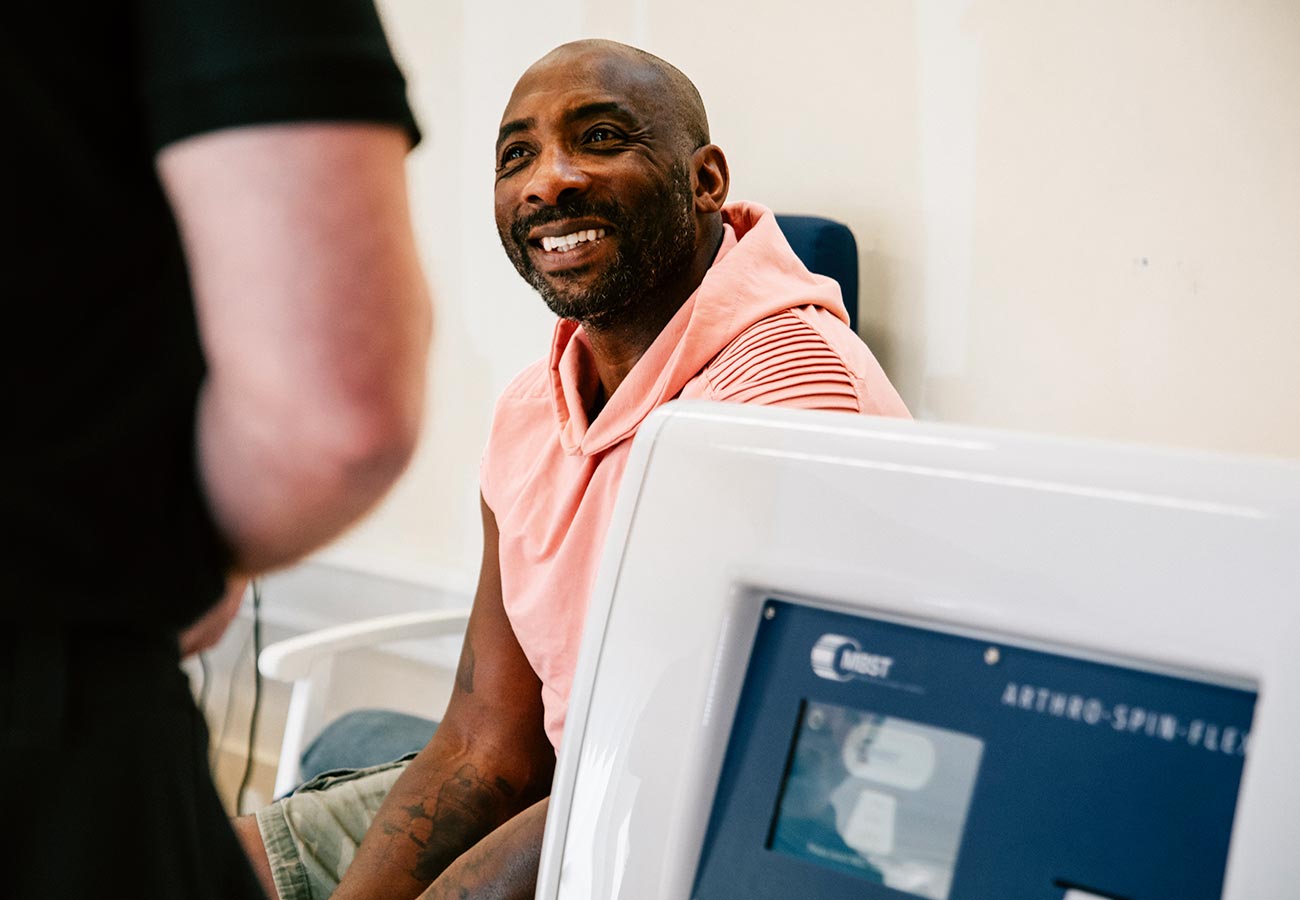In the UK, June is an important month, with a week dedicated to Men’s Health, providing a platform to address health issues that disproportionately affect men. It’s an opportune time for men to become aware of potential health problems and gather the courage to take action.

Here are 8 key takeaways from this article on Men’s Health Awareness Month:
- Consistency with small, sustainable health changes is key – build healthy habits over time that can be maintained long-term.
- Adopting an active recovery mindset and lifestyle helps improve physical and mental wellbeing.
- Staying active maintains strength, flexibility and functionality so aim for regular physical activity.
- Healthy eating involves balanced meals, portion control, hydration, nutrient-rich foods and mindful eating.
- Targeted awareness about prevalent diseases can lead to better education, earlier detection and more effective treatment.
- Destigmatising discussions around mental health issues like depression enables more men to seek crucial support.
- Johnny Nelson MBE credits MBST therapy for providing life-changing benefits for his neck, back and hand injuries.
- Men’s Health Month inspires men to prioritise wellbeing through consistency, activity, diet, reducing barriers and exploring treatments like MBST.
As a man who just turned 40, this is a cause that is near and dear to my heart, especially as I have suffered from depression in the past, and more recently started to notice a real difference in my physical health upon reaching my 4th decade. Reducing my beer intake and kissing goodbye to some “fun” foods for the sake of my health has been a necessary but somewhat painful sacrifice (farewell, daily bread… so long, gratuitous volumes of melted cheese). Now that I find myself on the other (wrong?) side of the big 4-0, I realised my knowledge and understanding of how to actually take care of myself was severely lacking.
This blog aims to inspire and encourage men who are concerned about their health, offering valuable advice on maintaining well-being through exercise and diet.
Let’s dive into practical strategies that can make a significant difference in men’s lives.
Reducing Barriers and Embracing Consistency
One of the keys to achieving optimal health is consistency. It’s crucial to overcome barriers and make health a priority in our daily lives. Remember, even small efforts made consistently can yield significant results. You don’t need to push your body to extremes to stay fit and healthy. By starting small and gradually building up, you can create lasting habits that contribute to long-term well-being. Focus on sustainable changes that you can maintain.

Recovery Mindset and Active Lifestyle
Recovery is not just physical; it’s also a mindset. Active patients tend to recover better, both mentally and physically. Believe in your abilities and have confidence in your journey to health. It’s essential to avoid comparing yourself to your younger self in terms of your ability and capability. Instead, embrace where you are now and acknowledge your progress. Every step forward is a victory. By prioritising recovery and adopting an active mindset, you can surpass your own expectations and achieve remarkable results.

Maintaining Activity for Strength and Movement
Consistency in physical activity is vital. When we stop engaging in activities like running, training, or playing sports, our overall fitness and mobility decline. By staying active, you give your body the best chance to maintain strength, flexibility, and overall functionality. Explore activities you enjoy and find ways to incorporate them into your routine. Whether it’s walking, cycling, swimming, or participating in team sports, find what resonates with you and keep moving. Remember, a body in motion stays healthier for longer.

Healthy Eating and Diet
Incorporating healthy eating habits is crucial for maintaining overall well-being. Here are some diet tips to help you make informed choices:
– Balanced Meals: Strive for a balanced plate that includes a variety of fruits, vegetables, lean proteins, whole grains, and healthy fats.
– Portion Control: Be mindful of portion sizes to avoid overeating. Listen to your body’s hunger and fullness cues.
– Hydration: Stay adequately hydrated by drinking plenty of water throughout the day. Limit sugary drinks and opt for herbal teas or infused water for flavour.
– Nutrient-Rich Foods: Choose nutrient-dense foods such as leafy greens, colourful fruits, nuts, and seeds to provide essential vitamins and minerals.
– Mindful Eating: Slow down and savour each bite. Pay attention to the taste, texture, and aroma of your food, promoting a healthier relationship with eating.
Remember, small changes in dietary habits can have a significant impact on your overall health. Consult with a healthcare professional or registered dietitian for personalised advice.

Depression and Disease
By shining a spotlight on conditions such as cancer, heart disease, and depression, this year’s campaign aims to equip men with the knowledge and resources they need to prioritise their well-being.
Poor health management plays a significant role in the development of various diseases that commonly affect men. Heart disease, for instance, is often attributed to factors such as high blood pressure, high cholesterol levels, smoking, obesity, and a sedentary lifestyle. By educating men about the importance of regular exercise, a balanced diet, and managing risk factors, Men’s Health Month strives to empower individuals to make positive changes and reduce the prevalence of cardiovascular issues.
Cancer, another prevalent concern, can be influenced by lifestyle choices and early detection. Men are at higher risk for certain types of cancer, including prostate and testicular cancer. Raising awareness about the importance of regular screenings, self-examinations, and understanding the signs and symptoms can lead to earlier diagnosis and more effective treatment.
Depression, often stigmatised and overlooked, is a mental health condition that affects men profoundly. Societal expectations, cultural norms, and reluctance to seek help can hinder men from addressing their emotional well-being. Men’s Health Month aims to destigmatise mental health discussions and encourage individuals to seek support, ultimately promoting early detection, treatment, and overall well-being.
Through education, awareness, and access to resources, we can make a positive impact on men’s health and well-being, fostering a future where preventable diseases are minimised and the quality of mental health is enhanced.

Inspiring Event by MBST Medical UK
In November 2022, MBST Medical UK hosted a Men’s Health Awareness evening at the At The Core clinic in Primrose Hill, London. This event brought together a panel of esteemed healthcare and medical professionals who shared valuable tips and insights to encourage men to invest in their long-term health. Among the distinguished guests was Johnny Nelson MBE, Former Undefeated WBO World Champion and MBST Medical UK ambassador. Johnny’s personal experience with MBST therapy and his journey towards recovery has been truly inspiring.
Embracing MBST Therapy for Life-Changing Benefits
Johnny Nelson MBE, having experienced years of neck pain, lower back problems, and hand injuries following his sporting career, found solace in MBST therapy. This innovative treatment provided him with life-changing benefits and accelerated his recovery process. His endorsement of MBST therapy emphasises that it is never too late to prioritise and invest in your health. If you’re struggling with similar issues, consider exploring the potential benefits of MBST therapy under the guidance of medical professionals.

Men’s Health Awareness Month serves as a powerful reminder for men to take charge of their health and well-being. By reducing barriers, embracing consistency, fostering a recovery mindset, maintaining an active lifestyle, and exploring innovative treatments like MBST therapy, men can embark on a journey towards a healthier and more fulfilling life. Remember, it’s never too late to prioritise your health and make positive changes. Your well-being matters, and by taking proactive steps, you can achieve long-lasting results. Let this month be a catalyst for change and a springboard towards a healthier future.

